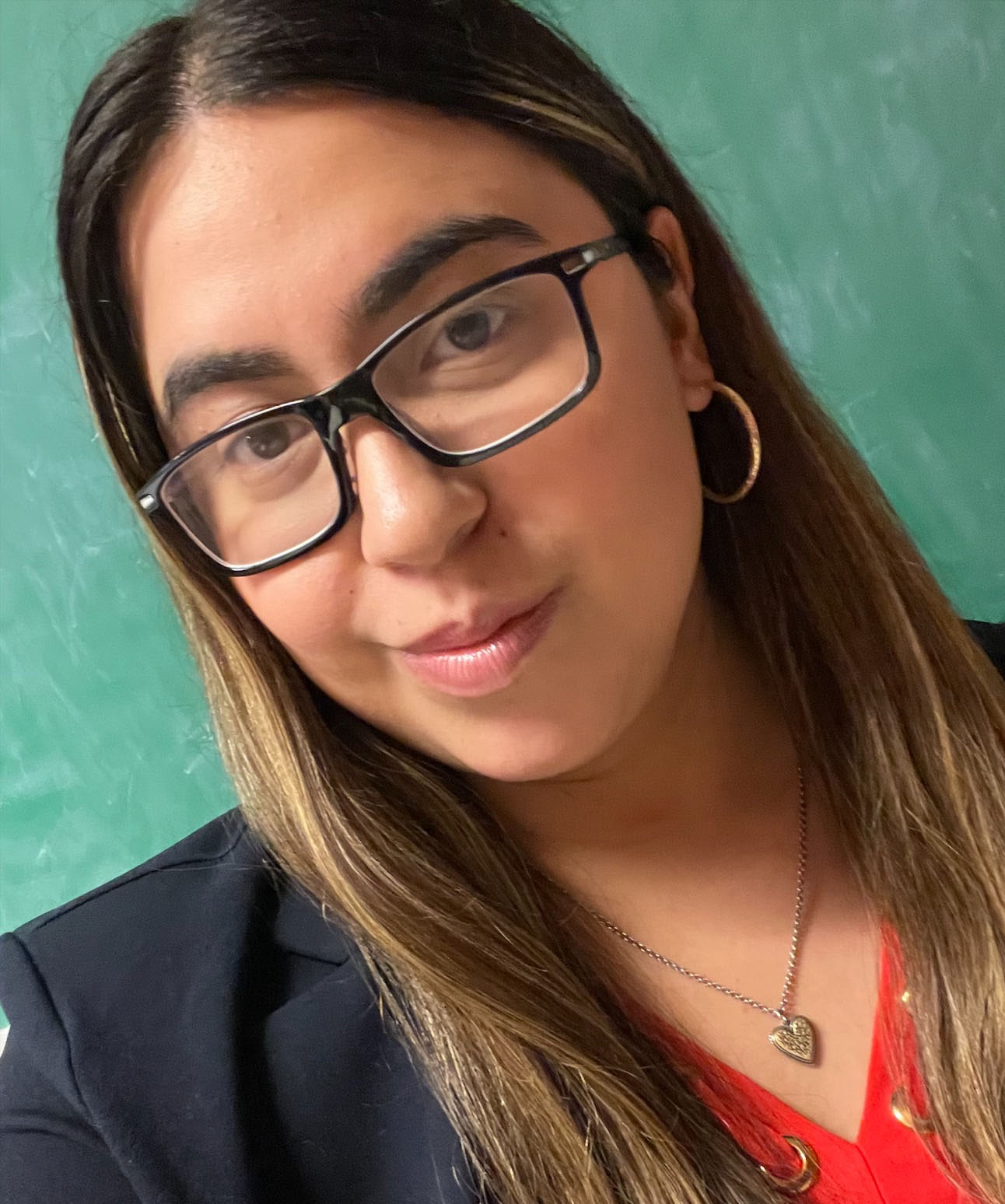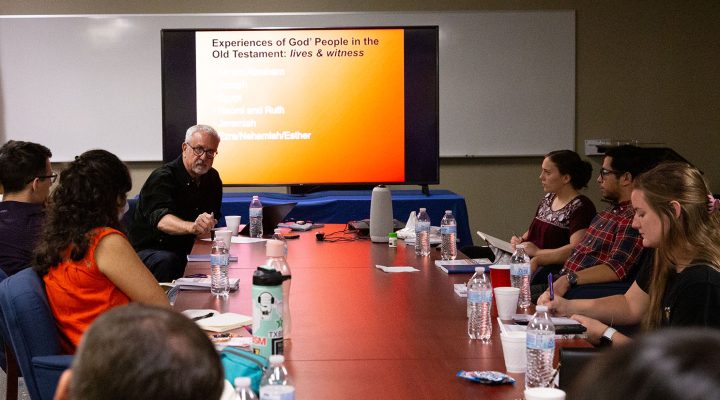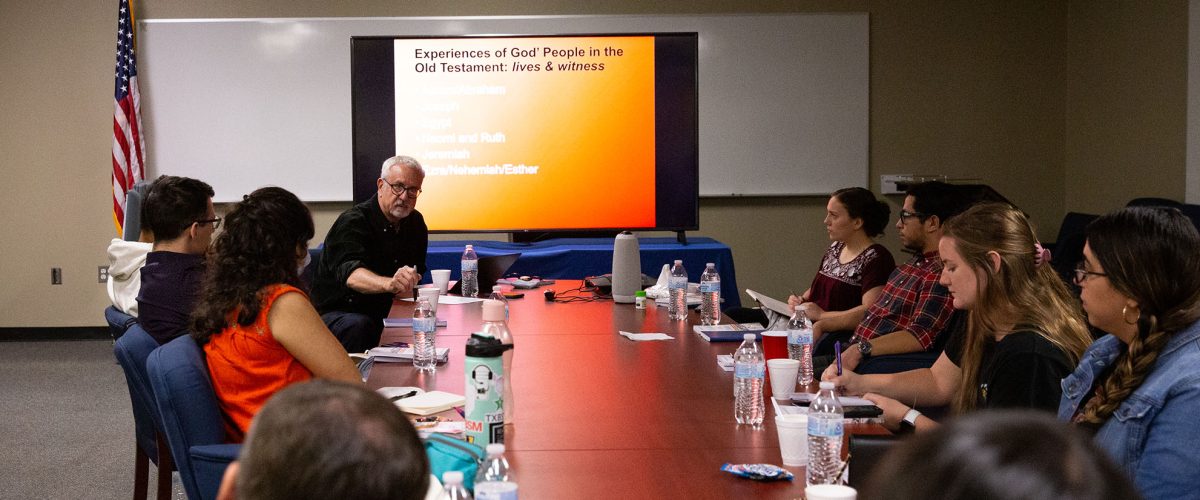“Don’t forget!” Those were the exact words a professor shared with us at the recent retreat for T.B. Maston Scholars.
I was touched in a way that was a call for action for myself and the Christian world. I am a Mexican-born Latina who moved to San Antonio for a better future with my parents, brothers and sisters. We hear so many times of immigration and “La caminada del desierto” (the walk in the desert) but never pause to truly listen to what this means for all our people who are continuously crossing to the United States or for us as church on what we are doing to help them.

Alfa Orellana
It never was as real for me as this experience I was privileged to participate in: The retreat with the T.B. Maston Foundation focused on immigration and poverty. Throughout the week, we were presented with strong leaders, pastors, missionaries and many more who work day-to-day with migrants, refugees and asylum seekers.
On our first day, we met with other students from multiple Texas Baptist seminaries and universities, including my university, The Baptist University of the Americas. We were to learn about immigration in a whole new way.
We met with Stephen Reeves, executive director of Fellowship Southwest, a network of churches whose focus is on serving others while providing compassion, justice, and connection. He made it clear that we may not be doing enough, especially with our governmental system. “It is hard to sustain an ever-changing system that is bigger and more broken than we thought,” he said.
He encouraged us to tell our stories and our personal experiences, which is our best advocacy.
“Throughout biblical history, we continuously see how the Bible was built on migration and why we must engage and inform the church on this ethical issue.”
The next day, we participated in a discussion and heard from Daniel Carroll, a professor of biblical studies and pedagogy, who gave us an overview of his book, The Bible and Borders. He provided a fantastic biblical point of view on why we are called to reach the nations, using examples from Scripture like Abraham, Joseph, Naomi and Ruth. Throughout biblical history, we continuously see how the Bible was built on migration and why we must engage and inform the church on this ethical issue.
Immigration is not a “secular” issue but an “all of us” issue. I keep stirring his words in my head: “Don’t forget!” Such powerful words touch my heart every time I replay them.
Sadly, even I, who once was a migrant, have forgotten mi gente who comes daily. As Carroll said, “We were once strangers in a strange land that is no longer strange to us.”
We have become so comfortable that we have forgotten the struggle we had to get here and that life in a country that used to be completely different. Some of our churches are comfortable in their circle and neglect the part where we must share the gospel and reach the “nations.” Carroll reminded us we need to be informed and educated on this issue as Christians.
We also met that day with the San Antonio Mennonite Church’s pastor, John Garland, who explained the different kinds of migrants and our call to serve “the less of these.” We were able to reflect on the process of an immigrant coming to the United States looking for asylum.
He shared the difficulties it implied and his personal experiences helping them adapt to society and providing shelter for them. I could tell he had a special place for them in his heart as he smiled at one of the men from Haiti who was serving in his church. We should all seek to be this kind of leader — loving and welcoming to all in need.
We ended our day of Jan. 3 serving dinner to the homeless at Communities under the Bridge: Church Under the bridge. Having this hands-on experience was essential as it brought our attention to the need of others and not only ourselves. It allowed us to see beyond the comfort of our Sunday service.
Under the organization’s director’s leadership, we excitedly prepared meals for 150 people. All from scratch! This woman told us she never repeats the same meal throughout the month. Her question to us was, “Would you eat the same food every day? What makes them different?”
She brought the term “equality” to its core definition. Just with this, we saw God’s love to serve others with compassion and equality, words I heard throughout this retreat.
The next day, we drove to Eagle Pass, Texas, to meet with Pastor Lorenzo Ortiz, director of El Buen Samaritano Migrante. This organization aims to provide relief to those who are seeking asylum in the United States and operates shelters across the border.
We heard on-the-spot testimonies from these individuals as we heard their true struggles. One woman shared how it took her almost one year to finally get to the United States from Honduras, as she encountered many setbacks others could identify with in her travels. One young woman, saddened, shared with us how her cousin had been kidnapped and she could no longer get in contact with him, which is way more common than we thought.
I also was awed when Pastor Lorenzo told us his personal testimony of how the cartel kidnaped him for helping these asylum seekers. I choked back tears as I heard all this. Many suffer injustices, extortion and other dreadful things to seek refuge here in the U.S. Many are captured by the cartel, forced to work for them, or even killed.
“How could I have forgotten my people, and how can I, as a Christian, have gotten too comfortable not to see beyond the four walls?”
One of the asylum seekers told us, “Even when you’re on the bus, the Mexican police will stop you and turn you in to the kidnappers.” This was so gut-wrenching. How could I have forgotten my people, and how can I, as a Christian, have gotten too comfortable not to see beyond the four walls? Was I not called to help these people? These questions crossed my mind as I returned to San Antonio.
On our last day, we met with Jesus Romero, director of Educational and Legal Immigration Ministries, who works advising refugees and asylum seekers on the legal aspects of immigration. His ministry vision is to “love the strangers among us.” They provide low-cost or free legal services for immigrants.
He shared how it is essential not only to learn the biblical aspect of immigration but also to be educated on the laws around immigration. So many laws keep changing, and immigrants must constantly adapt to these new laws. “We have a lot to learn and adapt from our own immigration history,” he told us.
To end the trip, we had questions and answers with other leaders: David Morgan, chair of the board of directors of the Maston Foundation; Karen Morrow, field personnel with the Cooperative Baptist Fellowship; Rick McClatchy, coordinator of CBF Texas; Stephen Stookey, professor at Wayland Baptist University); Katie Monroe Frugé, director of the Texas Baptist Christian Life Commission; and Mark Wingfield, executive director of Baptist News Global. I am thankful to these men and women who provided this life experience and for opening my eyes to the immigration ethical issue.
Many poured over us their life experiences and wisdom and urged us to learn, grow, educate ourselves and educate the church. I’ll leave you with this quote from Daniel Carroll: “It’s time to roll up your sleeves because immigration is a messy business.”
We are called to action. This experience will always be significant to me and a reminder for me to never forget.
Alfa Orellana is a student at Baptist University of the Americas working toward a master of arts degree in practical theology and ministry.
Related articles:
Maston Foundation immigration retreat opened my eyes | Opinion by Madison Lewis
When a Mexican cartel kidnapped a Baptist pastor, they got more than they bargained for
That time I was suddenly responsible for getting nine migrants through security at DFW Airport | Opinion by Mark Wingfield


